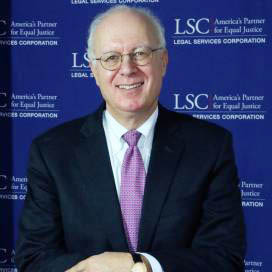
Memphis Area Legal Services hasn’t served local low-income residents well for years, according to its top funder.
In a rare move, the Legal Services Corp. — a nonprofit funded and overseen by Congress — decided to stop sending cash to the Memphis organization simply because of outstandingly poor performance, according to LSC president Ron Flagg.
Despite LSC having 131 partner organizations, Flagg said he can’t remember a time in his 11 years there quite like this one.
“(After) a couple years of work between LSC and Memphis Area Legal Services to try to improve (its) programs, we concluded that the services remained inadequate,” Flagg said.
At more than $1.7 million per year, LSC is MALS’ largest source of revenue. MALS, which provided free civil legal services to almost 1,800 low-income adults in 2022, will continue receiving the money through June 30. For the rest of 2024, the money will be directed to West Tennessee Legal Services, based in Jackson, which will then be responsible for serving the Memphis area.
Brian Heim, president of MALS’ board of directors, said the organization has asked LSC to reconsider this “surprising” decision.
“We can be better, and that’s what we are trying to do,” Heim said. “We think that MALS, especially with our new leadership and our people here in Memphis, are best positioned to continue to serve our community.”
Cindy Ettingoff, CEO of MALS since 2019, left the organization in early February. By the end of the month, the organization had named former local judge Loyce Lambert Ryan as interim executive director and Gortria Banks as COO. Ettingoff declined to comment for this story, and Heim declined to discuss the nature of her departure from the board.
Asked to describe MALS’s poor performance, Flagg listed four pieces of data: From 2018-2022, the nonprofit’s staff shrank by 33%, the number of cases closed by its staff lawyers dropped by 50%, its cases closed with pro-bono private lawyers dropped by 63% and its non-LSC funding dropped by 43%. By contrast, Flagg said West Tennessee Legal Services has been growing in each of these categories.
Heim said that the organization fundraised well in 2023 and now has more non-LSC funding than in 2018. He acknowledged that the nonprofit has had staffing challenges but argued for the normalcy of this in recent years (with post-COVID unemployment rates low). And he said the younger employees the nonprofit has hired in the last few years have gotten up to speed quickly and were on track to reverse the troubling decline in cases until they received the bad news from LSC.
A hack and a ‘kick in the stomach‘

Flagg also said he was disappointed by the way MALS handled a recent ransomware attack.
The nonprofit discovered the first week of January that its software and files had been compromised in a cyber attack. It took until the first week of February for it to resume taking requests for service or move forward on existing cases, which was disappointing, Flagg said.
“The issue … was the lack of workarounds, reaching out to other legal aid programs to help out … or taking in walk-in clients like the old days,” Flagg said. “The lack of basic client services was very concerning.”
Heim questioned this assessment.
“MALS suffered an unprecedented cyber attack. … It took a month to recover from it,” he said. “Could we have done better? Probably? Maybe? (But) that’s a big judgment to render from Washington, D.C. over our operations in Memphis.”
Heim said the board didn’t realize the organization may lose LSC support until November 2023, when it received a pair of reports — from LSC and a third-party consultant — on things it needed to fix. He said the board quickly developed and began implementing an operational improvement plan, as requested by the federal organization.
“Less than three months into that, they notified us that they didn’t have confidence we’d execute on our plan, and that was 45 days after we’d put our new executive leadership in place,” Heim said. “I asked LSC for feedback on our (improvement) plans. I did not get feedback on our (improvement) plans. The feedback I got was, ‘We’ve chosen to no longer fund MALS.’”
MALS is still trying to figure out what LSC’s decision will mean for its future, especially if it isn’t reversed, Heim said. The nonprofit may lose other grants as a result of losing LSC funding.
But in the meantime, Heim said Ryan is committed to sticking with the organization until another executive director can be found and that MALS remains committed to serving its clients.
West Tennessee Legal Services declined an interview request. But deputy director Caitlin Hakim said in a statement that her team looks forward to working closely with MALS during the transition and beginning to serve Memphis clients after June 30.
Memphis congressman Steve Cohen (D), serves on the House of Representatives Judiciary Committee, which is partially responsible for overseeing LSC. In a statement, he said he’s long supported LSC and was disappointed to hear the news of its decision.
“It’s like a kick in the stomach. I am most focused, however, on making sure there is a continuity of services for MALS clients and other Memphians who qualify for legal aid services,” he said. “This program is essential and vulnerable Memphians should not bear the burden of these decisions and apparent problems at MALS.”
Jacob Steimer is the housing and development reporter for MLK50: Justice Through Journalism. Email him at Jacob.Steimer@mlk50.com
This story is brought to you by MLK50: Justice Through Journalism, a nonprofit newsroom focused on poverty, power and policy in Memphis. Support independent journalism by making a tax-deductible donation today. MLK50 is also supported by these generous donors.
